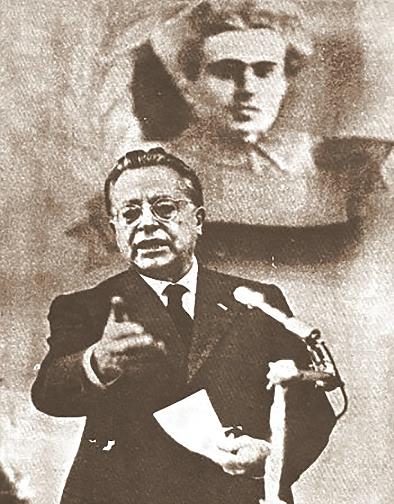
Palmiro Togliatti
1893-1964
“for Marxism, the development of the forms of production and of society does not proceed along peaceful lines but is a dialectic and revolutionary development. Contradictions develop and break out within capitalist society. Our task is to work on the basis of these contradictions, to gather together and guide the forces of the working class which are all developing within capitalist society as its unavoidable opponent and enemy, and not to support or consolidate the capitalist regime, but to prepare for and accelerate its overthrow through revolutionary class activity.”
– Palmiro Togliatti, 1928
"Parliament, in the past the instrument for the organisation and consolidation of the capitalist regime, can today become an effective instrument in the hands of the parties which aim at a socialist transformation of society"
– Palmiro Togliatti, 1956
Biography
Palmiro Togliatti was born in Genoa. He joined the Italian Socialist Party before the First World War. He served as a volunteer officer during the war, and on his return, joined the group around Antonio Gramsci and L'Ordine Nuovo paper in Turin. He helped found the PCI following the split in the Italian Socialist Party at their 17th Congress at Livorno in 1921. Beginning in 1922 Togliatti edited Il Comunista and in April 1924 became a member of the Central Committee of the Communist Party. While attending a Comintern meeting in Moscow in 1926, the CPI was banned. He became PCI Secretary in 1927 and organized the PCI clandestinely for the next 18 years under his nom de guerre, Ercoli. In 1928 he was elected to the Executive Committe of the Communist International. On his return to Italy in 1944 he led the PCI in the svolta di Salerno, the "Salerno Turn", joining the government of national unity and disarming PCI members who had been active in the resistance. When a right-wing student attempted to assassinate him in July 1948, armed workers seized power in Genoa, and occupied factories throughout Italy in a near-insurrection. The PCI leadership called on workers to abandon the armed strike and Togliatti called for the need to observe bourgeois legality. Togliatti developed a political position, arguing the necessity to seek political change through parliament, the "Italian Road to Socialism", a position which received biting criticism of the Chinese Communist Party in its polemic with the CPSU in the 1960s.This position was highly influential in several European Communist Parties which were attracted to what became known as Eurocommunism. Togliatti died August 21 1964 in Yalta. His posthumously published 'Memorandum' (included below) was highly influential in the Communist movement, giving encouragement to what bourgeois observers welcomed as 'liberalisation' of both socialist countries and the Communist movement.
Works:
Social
Democracy and the Colonial
Question, 1928
Parliament and
the Struggle for Socialism, 1956
Diversity and Unity
in the International Proletarian Communist
Movement, 1961
The 'Togliatti Memorandum',
1964